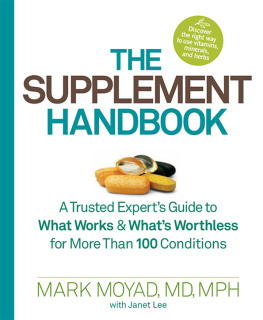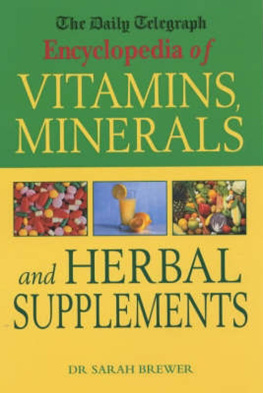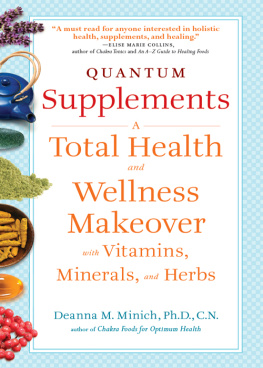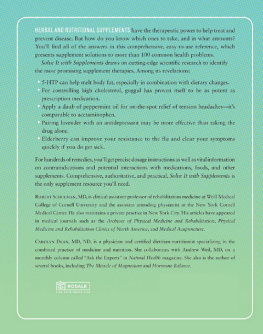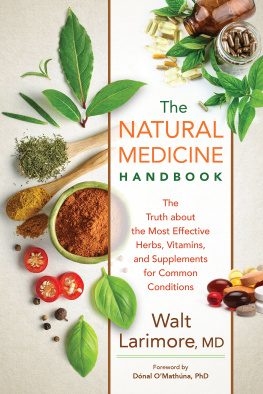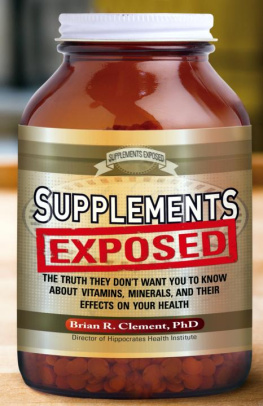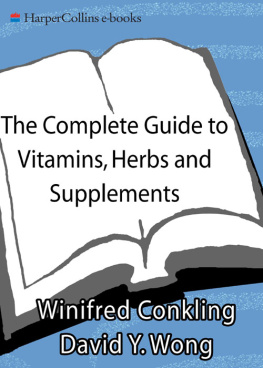
This book is dedicated to my wife Mia (the consummate social worker), who has been my best friend since the day we met. To say I won the lottery when I met her and raised our two wonderful kids Holly & Nicholas is actually an understatement (and, of course, our dog Chauncey, too).
It is also dedicated to my dadand doctorRobert Moyad, my mother Eva Moyad, my two brothers Andy and Tom Moyad, and my current boss and long-time mentor Dr. David Bloom.
And finally, this book is dedicated to the individualsEpstein, Jenkins, Pokempner, and Thompson who invested in the dream, which allow Mia and I to still make a difference, one starfish at a time.
This is intended to be used for educational and informational purposes only. Dr. Moyad does not advocate nutritional supplementation over medical advice or treatment. If using any drugs given to you by a doctor or received with a prescription, you must consult with the doctor in question prior to using any nutritional supplementation. If undergoing medical therapies, consult with your doctor about possible interactions between your treatment, any drugs being given, and possible nutritional supplements. Dr. Moyad does not assume liability for any actions undertaken after reading these pages, and does not assume liability if one misuses supplements. Unforeseen side effects can occur even at the recommended dosages, and thereby he does not assume liability for any side effects from supplements.
Mention of specific companies, organizations, or authorities in this book does not imply endorsement by the author or publisher, nor does mention of specific companies, organizations, or authorities imply that they endorse this book, its author, or the publisher.
Internet addresses and telephone numbers given in this book were accurate at the time it went to press.
2014 by Mark A. Moyad, MD
All rights reserved. No part of this publication may be reproduced or transmitted in any form or by any means, electronic or mechanical, including photocopying, recording, or any other information storage and retrieval system, without the written permission of the publisher.
Book design by Elizabeth Neal
Library of Congress Cataloging-in-Publication Data is on file with the publisher.
ISBN 978-1-62336-035-1
eISBN-13: 978-1-62336-036-8

We inspire and enable people to improve their lives and the world around them. rodalebooks.com
CONTENTS
INTRODUCTION
The master in the art of living makes little distinction between his work and his play, his labor and his leisure, his mind and his body, his education and his recreation, his love and his religion. He hardly knows which is which. He simply pursues his vision of excellence at whatever he does, leaving others to decide whether he is working or playing. To him he is always doing both.
L.P. J ACKS
HOW I BECAME THE SUPPLEMENT DOCTOR
I never intended to specialize in diet, lifestyle, and dietary supplements. I was supposed to be a urologist and join my fathers practice in Ann Arbor, Michigan, so we could do surgery side by side. But I realized very early in my medical career that I had about as much talent for surgery as my dog Chauncey did. I greatly appreciate the sheer beauty of what some surgeons, like my brother (Tom) and father (Robert), can do, but I simply didnt like it.
Instead, when I was just 22 years old, I researched, wrote, and published my first medical paper, with the help of Dr. Michael Kern from the College of Wooster in Ohio, on the effects of cottonseed oil on health. Shortly thereafter, I was one of the primary investigators of the L-tryptophan dietary supplement debacle in Florida; a huge tainted batch of supplements caused at least 37 deaths and 1,500 permanent disabilities. I interviewed patients to try to piece together what happened (it turned out it was a problem with the manufacturer; impurities produced at the plant got into the supplements). In the process of working on the medical paper and investigating what went wrong with L-tryptophan, I spent years doing extensive research on supplements. The seed was planted and this work became the foundation for what I do now.
Several years after the L-tryptophan incident, my cousin Firouzeh Moayyed died of breast cancer at the age of 38. Her death seemed so senseless, and I was so distraught that I made the emotional decision to tell her story wherever I could. I went on a speaking tour of the 50 states and encouraged people to contact their representatives in Washington, DC, to increase funding for cancer research. I thought this was the sole purpose of my tour, but something oddor perhaps spiritualhappened during that time. Wherever I lectured, cancer patients came up to me to ask about their diets and especially dietary supplements.
Back then, there was no Internet (hard to fathom, I know) and there really wasnt any education in medical school in the area of dietary supplements, so patients were desperate for answers. Does selenium fight prostate cancer? Does fish oil protect against breast cancer? What supplements will reduce the side effects of chemotherapy? Does a vegan diet improve the chances of surviving lymphoma? Does vitamin C reduce side effects from surgery? I was inundated everywhere I spoke and would spend 3 to 4 hours answering questions, almost all of which were about supplements. I think the audience was shocked that I could answer all their questions, so they just kept em coming!
I ended my trip by delivering the signatures I had gathered along the way to senators in Washington, DC, which eventually helped to increase funding for cancer research. After DC, I started thinking that maybe I could make a career out of specializing in dietary supplements, so I set up a consulting practice at the University of Michigan Medical Center in the department of urology. It had always been a dream of mine to work for this university, and I really wanted to do cancer-related research. At that time, the urology department was unusually open to conducting diet- and supplement-related research on many types of cancers. (Thanks go out to my current wonderful mentor and boss, Dr. David Bloom, and my former boss and mentor, Dr. Jim Montie, both world-renowned urologic surgeons, as well as Dr. Ken Pienta, a world-famous oncologist whos running an entire cancer research department at Johns Hopkins and whom I still miss very much.) When our research began, I was flooded with all kinds of patients (suffering from breast, colon, prostate canceryou name it) asking for dietary and supplement advice. Soon, people started coming to see me from all over the world. I was shocked, pleased, and spiritually moved; I felt like this was a way to honor my cousins memory.
During my first year at the University of Michigan, I met a patient with cancer named Phil Jenkins. Though I thought he came into my life so that I could help and heal him, it was he who helped meand changed my life. I had been giving him diet and supplement advice for his condition, and he asked me why no doctors were working full-time in this area. I told him the system was simply not set up to educate or train doctors in this category and that financially it was a dead end. (After they have accumulated more than $100,000 in debt during school, doctors want a job that can help pay the bills!)
One day I joked (and it was a joke) that if he contributed $1.5 million to a supplement endowment (which would be the first of its kind in the world), I could devote my life to studying dietary supplements and wouldnt have to charge people for my advice if they were indigent. A few days later, Mr. Jenkins wrote a check for $1.5 million (I still shake my head in disbelief over this). Now, more than 20 years later, I have the same position, but the endowment has grown substantially thanks to other notable donors, including Josh Pokempner and his wife Gretchen (who were not patients but simply wanted to fund a position for a full-time doctor who focused solely on nutrition and supplements), Robert and Ellen Thompson, Daniel and Phyllis Epstein, and many more.
Next page
